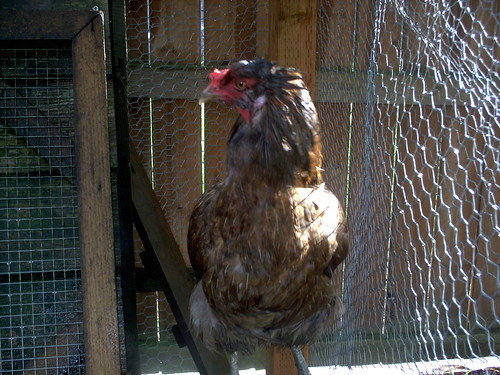
Here is my long-lived chicken, named Wicked Witch. She is over 10 years old, and no longer lays eggs, but she has been the survivor of so many events that killed her sister hens off that I feel like she has earned her elder years in my back yard.
My own chicken stories wouldn't be out of place in the memoir Farm City: The Education of an Urban Farmer by Novella Carpenter, which is an account of a keeping a mini farm in inner city Oakland, CA. Carpenter and her boyfriend rent an upstairs apartment and keep bees on the deck, chickens and other fowl in the yard, and a "squatter's" garden in the vacant lot next door. As they are surrounded by homeless men, gang activity, and drug users, she experiments with self-sufficiency and food security.
In the first section of the book Carpenter raises a turkey from a day old chick to maturity and kills it and cooks it for her Thanksgiving dinner. She is confronted by the issues of meat eaters - it is just a cop out to give the job to someone else, but it is hard to actually kill.
I inhabit this murky middle ground, believing that we need to treat animals humanely, and yet not sure about vegetarianism. When I was 18, my mother got her first meat birds. It was quickly clear who in the family was not going to be the butcher - I just couldn't face killing. And, rather than be a hypocrite, I became a vegetarian. I read Diet for a Small Planet, and I cooked careful veggie meals from Moosewood Cookbook.
It was pretty hard for me to stick to it, because I also have food allergies, gluten and lactose intolerance, and a genetic blood disorder called elliptocytic anemia. It is not in my food security interests to give myself another hurdle in finding dinner, and it turned out to be very bad for my anemia to be a vegetarian. When I met my husband (the child of two vegetarians, raised vegetarian) he was an unrepentent meat lover.
So, now we are omnivore's, trying to be ethical about it. I like to cook vegetarian several times a week, and I try to keep the meat as a small part of the meal, rather than having giant chunks of it with a tiny bit of green stuff on the side. And we keep our own chickens for eggs and shop for our meat from local sources as much as we can.
But we're still consumers, removed from the cycle of life and death that bring that meat to our dinner table. And I don't think that is best for us, best for our kids, or best for our planet. Ideally, we would all understand the sacrifice as life dies so that other life may live. Ideally, we would all honor the animals we eat. Ideally, we would only kill and eat what we really needed to in order to survive ourselves.
Every day, I face the dilemma of what to eat, and how it came to my plate. We can't all live on a farm, or even keep a city farm like Carpenter did, but it's good to be reminded of how basic to our lives food really is.

No comments:
Post a Comment